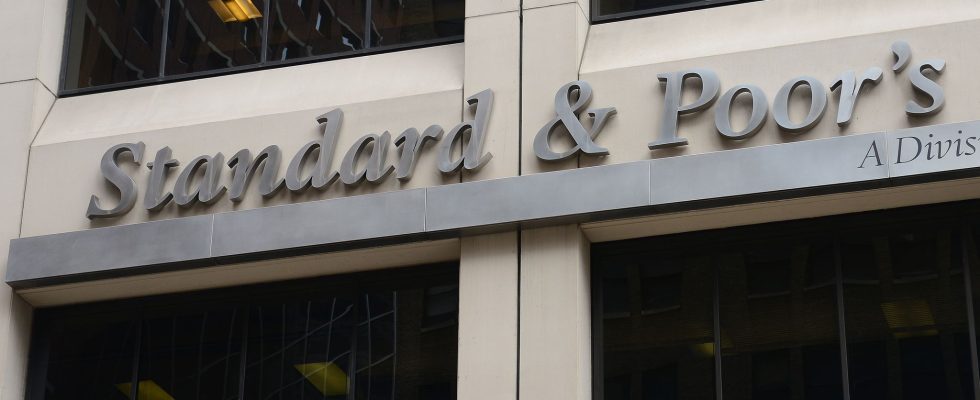Bercy is in turmoil. This Friday, June 2, the rating agency Standard & Poor’s must decide on the French economy. A month ago, its competitor Fitch lowered France’s rating to AA-. But what do they base their verdict on? Two economists responded to L’Express.
What are rating agencies for?
Measuring the risk of payment default presented by the borrower, whether it is a company or a State: this is the role of the rating agencies. They issue a rating that takes into account whether the debt issuer is solid, whether it is able to meet its deadlines, and whether its situation is likely to deteriorate in the coming months. The rating is expressed in the form of letters followed by a “-“, a “+” or numbers such as 1 or 2. The higher it is (the famous triple A being the best, D the worst), the more the judgment is considered positive.
“For private companies that issue private bonds, it is mandatory to obtain a rating,” explains economist Xavier Timbeau, director of the French Observatory of Economic Situations (OFCE). “The sovereign bond rating service is provided by rating agencies as a sort of loss leader, but is not government sponsored.”
What are the main agencies?
At the world level, three giants are vying for the podium. These are the Standard & Poor’s, Fitch and Moody’s agencies, which form a quasi-oligopoly.
How are they funded?
It is bond issuers, such as corporations, that fund the work of the agencies, paying to receive this assessment. “A small proportion of agency turnover comes from investors via subscriptions, training and seminars,” adds economist Norbert Gaillard, a specialist in rating agencies.
What criteria do the agencies use to rate?
To estimate whether a company or a State is able to repay the money he or she wishes to borrow on the financial markets, the rating agencies base themselves on various indicators which vary according to the entity evaluated – company, bank, State or local authority.
With regard to the States of the euro zone such as France, five main categories of criteria are taken into account, details the specialist Norbert Gaillard: (1) political and institutional criteria (rule of law, ability of institutions to achieve majorities , history of payment defaults, etc.), (2) economic criteria (GDP per capita, unemployment rate, etc.); (3) external position (trade balance, ability to attract foreign capital); (4) budgetary criteria (ratio of public debt to GDP, ability to raise taxes, etc.); (5) monetary criteria which are in fact based on the action of the European Central Bank and not on that of the government (ability to fight against inflation, monetary credibility, etc.).
What impact can a rating downgrade have?
In theory, a downgraded rating leads to higher interest rates at which debt issuers like France borrow on the markets. In the facts, it is far from always the case.
First, France’s default risk has been extremely low for over a century. Rating downgrades are also anticipated by investors and do not systematically result in a rate hike. To have a significant impact, a rating downgrade of several notches is often necessary. However, this should not be the case for France on June 2.
Along with the rating, the agencies also render an outlook which can be negative, stable or positive, and indicates the probable evolution of the rating within two years. This opinion is also an important signal for the markets and international institutions.
Why is this important?
For a state, a rating downgrade is more of a political disavowal. “It is more a form of judgment on government policy, on the economic and budgetary situation of the country, than really a risk of an increase in the cost of financing”, explains Xavier Timbeau of the OFCE.
This explains the eagerness of the Minister of the Economy to defend the sustainability of the French economic trajectory with S&P ahead of his verdict. “If there are no consequences on the financial markets [à cette dégradation], there are on the other hand European political consequences”, analyzes the economist. “In 2024 the stability and growth pact will be restored, France could find itself in a situation of excessive deficit, with injunctions from the European Commission to improve its public finance situation. The French government is therefore sending the message that it is attentive to its public finances.
Are rating agencies often wrong?
Rating agencies have long hidden behind the argument that their rating is just an opinion, protected by the US First Amendment.
But it is always possible for them to rate too low, while the issuer ultimately avoids default; or on the contrary to value too high a debt issuer who will default – and it is this second case that is the most worrying. This is what happened, for example, with the Lehman Brothers bank during the crisis of 2008, which will finally fall into bankruptcy, when it was well rated by all the big agencies.
“These gross errors were due to major conflicts of interest that were widely documented by US regulators and legislators in 2007-2009,” says Norbert Gaillard, who explains that private and sovereign sector ratings are historically more reliable. The economist nevertheless points out that the agencies were still rating Greece and Cyprus in the ‘A’ category… two years before their default.
